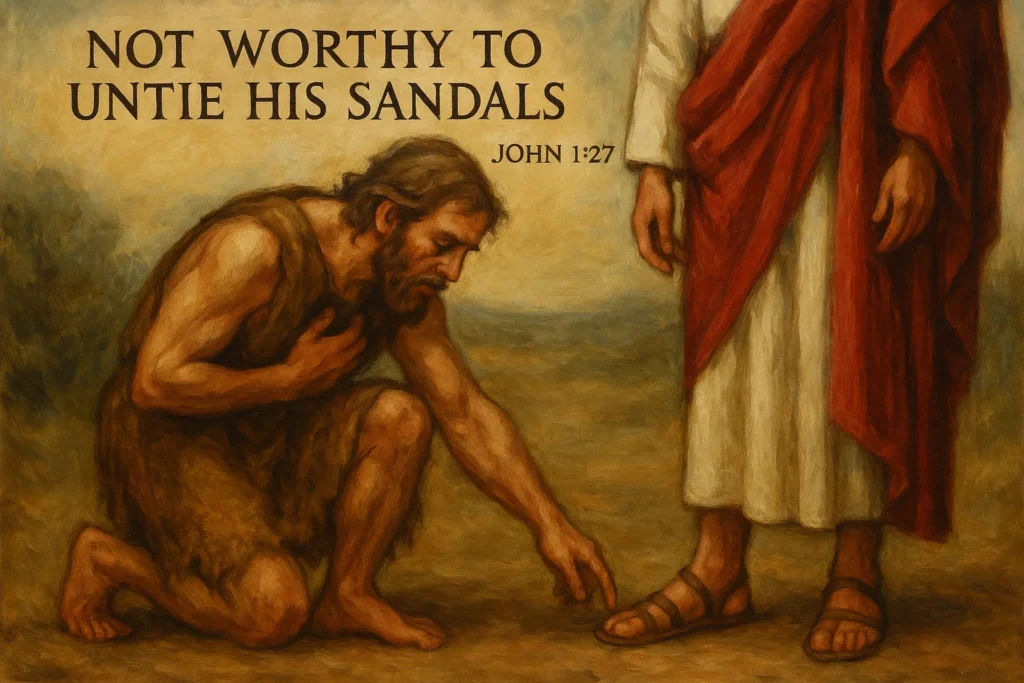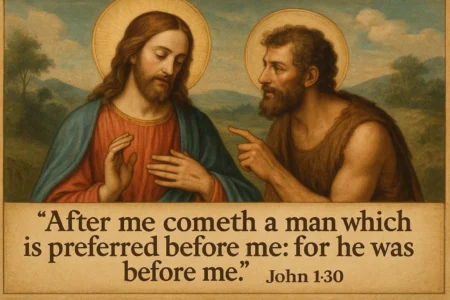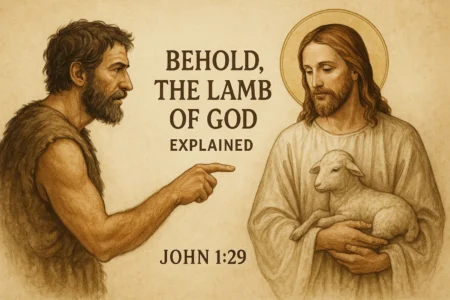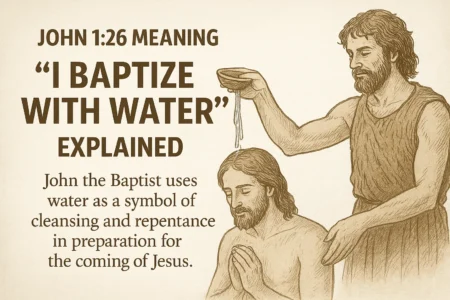Humility feels… out of place, doesn’t it? We’re all supposed to be building our brand, owning our worth, and making sure our highlight reel is perfectly curated. “Look at me!” is the anthem of our age.
But then, every once in a while, you run into something. Or someone. Something so genuinely big, so truly impressive, it just pulls the plug on all your self-promotion. You feel small. Not in a bad, “less-than” way. It’s that good kind of small. The kind you feel staring out over the Grand Canyon or up at a truly dark, star-filled sky.
It’s awe. Simple as that.
The Bible’s cast is full of giants, but John the Baptist is in a league of his own. He’s this fiery, wild man, the total opposite of an “influencer.” He lived in the desert, wore camel’s hair, ate bugs… and yet, people flocked to him. Droves of them. They walked miles to hear him preach repentance and to be baptized. By any standard, the man was a superstar.
So, when this giant of a man is asked about the next guy, the One coming after him, his answer is just stunning. It stops me every time. He points to Jesus and says, “He is the one who comes after me, the straps of whose sandals I am not worthy to untie” (John 1:27, NIV). That one verse is what we’re going to unpack. We’re digging into the John 1:27 meaning, because this isn’t just polite, “aw shucks” humility. It’s a radical, world-tilting statement of truth, hidden inside a gritty, everyday picture.
More in John Chapter 1 Category
Key Takeaways
- A Job for the Lowest Slave: Untying sandals in the first century wasn’t just a gross job; it was the lowest job, reserved for a non-Jewish slave. Even a disciple or a Hebrew slave was considered “too good” for it.
- John’s Radical Statement: John is saying his status next to the Messiah is lower than the lowest person on the social ladder. This isn’t just self-deprecation; it’s a theological bombshell about the gap between a prophet (himself) and God in the flesh (Jesus).
- It’s All About Jesus’s Supremacy: The John 1:27 meaning is really about Jesus’s infinite worth. If the greatest prophet of all time isn’t even worthy to be Jesus’s slave, then who is Jesus? It’s a powerful pointer to Christ’s divinity.
- A “Pointer” Ministry: John’s whole life was about pointing to someone else. His statement perfectly captures his mission: “He must increase, but I must decrease” (John 3:30). He shows that real greatness is about making Jesus look great, not yourself.
- A Challenge to Our Ego: This verse directly confronts our cultural obsession with status and self-worth. It asks us to find our value not in being worthy, but in knowing the One who is.
So, Who Exactly Was This Guy in the Desert?
Before we get what John said, we have to get who John was. This wasn’t just some guy yelling on a corner. If you were a Jew in Judea around 29 AD, you knew John. You couldn’t miss him. He was the topic of conversation everywhere, from the Temple courts to the fishing boats.
He was, to put it mildly, a phenomenon.
His birth was a miracle, announced by an angel to his parents, Zechariah and Elizabeth, who were old and had no children. He was, in fact, a relative of Jesus. He chose a hard life in the wilderness, deliberately modeling himself after the great prophets of Israel’s past, especially Elijah. He wasn’t just a teacher; he was a prophet.
That was a massive claim. The prophetic line was believed to have stopped centuries before. But here was John, speaking with an authority that hadn’t been heard in generations.
His message was like a cannonball: “Repent, for the kingdom of heaven is at hand!” He didn’t sweet-talk anyone. He famously called the religious elite a “brood of vipers.” He flat-out demanded that people change their whole lives, turn from sin, and get right with God. His baptism in the Jordan River was the outward sign of this inner cleansing.
Was John the Baptist Kind of a Big Deal? (Spoiler: Yes)
It’s tough to overstate this. John wasn’t just a big deal; he was the deal. Josephus, a first-century Jewish historian, even wrote about him, noting his massive popularity and the fact that the political leaders saw him as a threat. People were coming from all over to see him.
Why? You have to understand the mood. The Jewish people were in a pressure cooker. They were oppressed by the Roman Empire. They were desperate for a sign from God, for the prophecies to come true. They were waiting on pins and needles for the Messiah—the “Anointed One.” They believed he would come, boot the Romans out, and restore Israel’s kingdom.
And John? He looked, sounded, and acted exactly like the prophet who was supposed to come before the Messiah. The prophet Malachi had written, “Behold, I will send you Elijah the prophet before the great and awesome day of the Lord comes” (Malachi 4:5). John, with his camel-hair outfit and desert life, was a living, breathing fulfillment of that expectation.
This is the backdrop for everything. The air was buzzing. Every sermon, every baptism, was filtered through one massive question.
“Are You the One?” Why Everyone Kept Asking John if He Was the Messiah
With all this going on, the question was bound to be asked. The crowds hearing him wondered, “Is this him?” Even the priests and Levites—the religious top brass—sent a formal group from Jerusalem to ask him straight up: “Who are you?” (John 1:19).
Let that sink in. The highest religious authority in the land sent an official investigation. That’s how big John’s movement had become.
And this is where John’s character just shines. He had the perfect opportunity. He could have played it coy. “Maybe,” he could have whispered, letting the hype build. He had the crowd, the charisma, the moment. He could have made it all about him.
But he doesn’t. Not for one second.
The Gospel of John is crystal clear. He “confessed, and did not deny, but confessed, ‘I am not the Christ'” (John 1:20). He doesn’t just say “no.” He confesses it. He’s emphatic. He shoves the spotlight off himself as hard as he can. They push him: “Are you Elijah?” “No.” “Are you the Prophet?” “No.”
They’re baffled. “Who are you, then? We need an answer!”
John gives them an answer, but it’s not about him. It’s about his job. He quotes the prophet Isaiah: “I am the voice of one crying out in the wilderness, ‘Make straight the way of the Lord'” (John 1:23).
I’m just the voice. Not the Message. I’m just the warm-up act.
And it’s in this context, after he has systematically torn down any idea that he is the main event, that he finally points to the real Messiah, Jesus. And he uses this shocking, unforgettable image of the sandal.
“Not Worthy to Untie His Sandals”… What Does That Even Mean?
We hear that phrase and just think, “Oh, that’s nice. He’s humble.” But we’re missing the punch. We’re reading it 2,000 years later. A first-century listener would have gasped.
When John said this, he was making a claim that was as specific as it was flooring. This isn’t just a flowery metaphor. It’s a specific, social, and even legal picture that has a razor-sharp meaning.
To get it, we have to talk about feet.
How Dirty Were Feet in First-Century Judea?
In one word: disgusting.
Seriously. Forget paved roads and clean floors. Imagine a world of dirt paths. And those paths were shared by everyone—people, donkeys, camels, oxen, sheep. That means the roads weren’t just dusty; they were littered with animal waste.
Everyone wore open-toed sandals. Not shoes. So by the time you walked… anywhere… your feet were caked in a nasty mix of dust, grime, mud, and dung. They were absolutely filthy.
Because of this, foot-washing wasn’t a luxury when you entered a house. It was basic hygiene, just like washing our hands, but maybe even more important. A host would always give a guest water to wash their own feet. A rich host would have a servant do it for them.
This brings us to the sandals. Before the feet could be washed, the sandals had to come off. This meant kneeling on the ground, in front of the person, handling their filthy footwear. You were at the lowest possible position, handling the dirtiest part of a person.
It was, quite literally, the lowest job.
Why Was Untying Sandals Such a Lowly Job?
Here’s the key. This task wasn’t just gross. It was socially and legally degrading.
In the rabbinic traditions of the time, there was a bright, clear line drawn between a disciple and a slave. A disciple (a student) was expected to serve his rabbi (his teacher) in almost every way. He’d carry his books, prepare his meals, listen to his teaching. It was a relationship of deep, devoted service.
But there was a line.
A well-known rabbinic teaching, which was later written down in the Talmud, said that a disciple must do everything for his teacher that a servant would, except for one thing: “untie his sandal.”
Why? Because that specific act was the exclusive job of a Gentile slave. A non-Jew. Not even a Hebrew slave, who had more legal rights, could be forced to do it. It was the absolute bottom rung of the social ladder. It was the task that screamed, “You are property. You have no dignity. You are the lowest.”
By making this one task off-limits, the rabbis were saving one last shred of dignity for a disciple. They were saying, “You’re a student, not a slave.”
Did John Just Invent This Saying?
No. He weaponized it.
John the Baptist, a deeply educated man, knew this teaching. His audience knew it, too. They knew exactly what that line meant.
So when John, this great prophet, this man everyone was whispering about, stands up and says…
“I’m not even worthy to do the one thing a student is forbidden to do.” “I’m not worthy to be his Hebrew slave.” “My place, next to him, is lower than the lowest Gentile slave.”
…this isn’t just humility. This is a theological bomb.
He’s saying the gap between him and Jesus isn’t the gap between a good teacher and a great one. It’s not between a prophet and a bigger prophet.
He’s saying the gap is infinite. It’s the gap between the created and the Creator.
This is the entire John 1:27 meaning. John is making a direct claim about the identity and nature of Jesus. He’s saying, “You all see me and think I’m great. But the One who’s coming… He’s not even in the same category. He is the Lord. And I am nothing beside Him.”
You can learn more about the specific cultural and legal status of slaves in the Roman world from academic sources, like this overview of slavery in ancient Rome from the University of Colorado’s Classics Department. The context of Roman-occupied Judea makes John’s statement even more potent.
Why Would John Say This About Himself?
This kind of talk makes our modern, self-esteem culture wince. It sounds like self-hate. We want to pat him on the back, “John, no! You are worthy! You’re an amazing prophet!”
But John would have just shaken his head. He wasn’t talking about his inherent value as a person. He was talking about his relative position to absolute holiness.
This wasn’t a man with low self-esteem. This was a man with a high God-esteem. He had seen something. He had a perspective we’ve mostly lost.
Is This Just Humility, or Something More?
It’s more. It’s reverence. It’s awe.
Humility is knowing your place. Reverence is knowing God’s place.
I remember my first “real” job out of college. I was 22, had a marketing degree, and was totally convinced I was a genius. I’d walk into meetings ready to drop my brilliant ideas, sure I was one clever slogan away from a corner office. I was, in my own head, “the man.”
Then I got assigned to work under a guy named David. David was in his late 50s. He was quiet. Never dominated a room. But when he spoke, everyone leaned in. He’d ask one quiet question that would untangle a whole mess, leaving the rest of us just blinking.
I spent my first two months trying to impress David. Talking faster, using bigger words. It’s embarrassing to look back on.
Finally, I just shut up. I stopped trying to perform and just watched him. I watched how he listened. I watched how he treated the receptionist with the exact same respect he showed the CEO. I watched him take the heat for a team failure and pass on the credit for a team win.
And it hit me. I wasn’t in his league. I wasn’t even playing the same sport. My “brilliance” was just noise. His quiet was profound.
It was a deeply humbling, sandal-untying moment for me. I had to realize I wasn’t the expert. I wasn’t even a good novice. I was the guy who needed to get the coffee and just learn. I had to decrease.
This is what John is feeling, but on a cosmic scale. He wasn’t putting himself down; he was just seeing Jesus clearly. When you’re standing next to the sun, you don’t brag about your flashlight.
“He Must Increase, But I Must Decrease”: John’s Mission Statement
This “sandal” comment wasn’t a one-off. It was John’s whole life.
Later, in John’s Gospel, his own disciples get jealous. They come to him complaining, “Rabbi, that man who was with you on the other side of the Jordan—the one you testified about—look, he is baptizing, and everyone is going to him!” (John 3:26).
They’re upset. Jesus’s ministry is growing, and John’s is shrinking. They see a competition.
John’s reply is just beautiful. He says, “The bride belongs to the bridegroom. The friend who attends the bridegroom waits and listens for him, and is full of joy when he hears the bridegroom’s voice. That joy is mine, and it is now complete.”
And then he gives his motto: “He must increase, but I must decrease” (John 3:30).
John didn’t see himself as the star. He was the best man. His job was to get the bride (that’s us) ready, and when the Bridegroom (Jesus) showed up, to get out of the way and point everyone to Him. His joy wasn’t in being the guy; his joy was in knowing the Guy.
If John is This Low, Who Does That Make Jesus?
This is the real takeaway. John’s statement is a rhetorical rocket. It’s meant to launch our understanding of Jesus into a totally different orbit.
The logic is rock-solid.
If this man—John, the one prophets foretold, the miracle baby, the greatest prophet ever, a man so holy that all Jerusalem was trekking to the desert to see him—if that man says, “I’m not even fit to be his slave”…
Then who in the world is Jesus?
The only answer that makes sense is: He’s not from this world.
More Than a Prophet, More Than a King?
John’s words just shatter every existing category.
- Is Jesus a teacher? A disciple would never, ever say this about his teacher.
- Is Jesus a prophet? John is the prophet, and he’s bowing out.
- Is Jesus a king? You might be a slave to a king, but John says he’s unworthy to even be that.
This is a statement of divinity. John is saying Jesus is in a category of one. He’s not just another link in the chain; He’s what the entire chain was pointing to. He’s not just a messenger from God; He is God being the message.
The rest of John’s Gospel is a series of witnesses confirming this. But John the Baptist is witness number one. His testimony is the opening blast.
What’s the Difference Between John’s Baptism and Jesus’s?
John explains the difference himself. In the other Gospels (Matthew, Mark, and Luke), this sandal statement is tied directly to a comparison of their baptisms.
Mark 1:7-8 puts it this way: “After me comes the one more powerful than I, the straps of whose sandals I am not worthy to stoop down and untie. I baptize you with water, but he will baptize you with the Holy Spirit.”
This contrast is everything.
- John’s Baptism: Was about repentance. It was an outer sign of an inner choice to turn from sin. It was symbolic. It was water.
- Jesus’s Baptism: Is about transformation. It’s an inner, spiritual reality. He doesn’t just get you wet; He immerses you in the very life and power of God, the Holy Spirit.
John is saying, “I can get you wet, but He can change your heart. I can point out the problem, but He is the solution. My work is external. His work is internal. I’m just a man. He is the Lord.”
The sandal statement is the setup. The baptism statement is the punchline.
Did Matthew, Mark, and Luke Hear the Same Thing?
It’s always a good sign when a story lines up. And on this, the four Gospels are in total agreement. All four of them—Matthew, Mark, Luke, and John—saw this as a critical moment. They all record John’s “unworthiness” statement. It was clearly a core memory for the early Church.
A Quick Look at the Synoptic Gospels
The wording is a little different in each, which actually strengthens the case. It shows we have multiple, independent witnesses to the same event, not just one guy copying another.
- Matthew 3:11: Says John wasn’t worthy to carry his sandals.
- Mark 1:7: Says John wasn’t worthy to stoop down and untie them.
- Luke 3:16: Also says John wasn’t worthy to untie them.
Why the Small Differences Matter (and Why They Don’t)
So, Matthew says “carry” while the others say “untie.” A contradiction?
Not at all. Think about any event you’ve heard three friends describe. One might say, “The car ran the red light.” Another might say, “The blue Honda just blew right through the intersection.” A third might say, “That guy was driving like a maniac; he didn’t even slow down!”
Are they contradicting each other? No, they’re just remembering different details of the same event.
Carrying and untying sandals were both slave duties. Whether John said “carry,” “untie,” or (most likely) both at different times, the message was identical. The point wasn’t the verb. The point was the sandal.
The core testimony of all four Gospels is: John the Baptist saw Jesus and said, “Next to Him, I’m less than a slave.” That message was so clear and powerful it was burned into the Church’s memory.
Okay, This Is Deep… But How Does This Apply to Me?
This is where it gets real. It’s a great story, profound theology. But what do we do with the John 1:27 meaning? How does it change how we live in a world screaming at us to “increase”?
Are We All Called to Be “Less Than Slaves”?
No. That’s not the punchline. This isn’t a call to self-loathing.
The story doesn’t end with John’s statement. It starts there.
The amazing, mind-blowing twist of the entire Gospel is what Jesus does next.
John says, “I’m not worthy to untie his sandals.” And what does Jesus do?
A few years later, in an upper room, Jesus—the One who is worthy—gets up. He takes off his robe, grabs a towel, pours water in a basin… and he gets on his knees.
He, the Lord, washes his disciples’ nasty, filthy feet. He takes the very job John wasn’t worthy to do, the role of the lowest slave, and he does it himself.
Peter is shocked. “Lord, you will never wash my feet!” (John 13:8). He’s saying, “I get it! You’re the Messiah! This is wrong!”
And Jesus says, “Unless I wash you, you have no part with me.”
The John 1:27 meaning is that we are not worthy. The John 13 meaning is that He loves us anyway. He closes that infinite gap not by demanding our service, but by serving us.
What Does True Humility Look Like in the 21st Century?
So, true humility isn’t thinking less of yourself. It’s thinking of yourself less.
It’s having your perspective so locked on God’s greatness that your own ego just… quiets down. It’s not crushed; it’s just not the center of the universe anymore.
My wife and I, we’re both driven people. We both have careers. And for a long time, I’ll be honest, I measured my “success” in the family by my own scoreboard. My projects. My wins.
A few years ago, she got an opportunity for a major leadership role. It was a huge step up, something she’d absolutely earned. But it also meant more travel, longer hours, more stress.
My first, honest, selfish thought was, “What about my schedule? Who’s doing the school drop-offs? What about my deadlines?” I was worried about how her “increase” would force me to “decrease.”
And this very concept just hit me. This isn’t a competition. We’re a team. I realized my job in that season wasn’t to fight for the spotlight; it was to aim the spotlight.
My job was to decrease so she could increase.
That meant I took over the drop-offs. I learned to cook more. I became the “plus-one” at her work events, just holding her coat and feeling proud. It was my turn to “untie the sandals,” to clear the path.
And you know what? Watching her succeed in what she was called to do was more deeply satisfying than any personal “win” I could have chased. That’s the joy John was talking about. The joy of the “friend of the bridegroom.”
True humility in our world might just look like:
- Genuinely celebrating a co-worker’s win, even when you were overlooked.
- Putting your phone down, all the way down, and giving someone your full attention.
- Listening to someone you disagree with, not to reload for your next argument, but to actually hear them.
- Doing a thankless job well, not for the credit, but just because it needs to be done.
- Admitting you’re wrong. Simply. Without adding a “but…”
That’s the sandal-untying mindset.
The Man Who Pointed the Way
John 1:27 is so much more than a dusty old phrase. It’s a key. It unlocks the whole Gospel. It’s a doorway into understanding both true humility and true majesty.
In this one, gritty sentence, John the Baptist does three things:
- He defines himself: “I’m a voice. I’m the best man. I’m a signpost.”
- He defines Jesus: “He’s the Lord. He’s the Bridegroom. He is infinitely worthy.”
- He defines us: We, like John, aren’t worthy. But—and this is the whole point—the One who is worthy kneels to wash our feet.
John’s greatness wasn’t ultimately in his preaching or his baptism. His true, lasting greatness was in his sharp, unshakeable understanding of who he was not.
He was not the Christ.
He was the man who pointed the way. And in a world obsessed with being the destination, maybe there’s no greater purpose than to be a faithful signpost, pointing away from ourselves and toward the One who is.
FAQ – John 1:27 Meaning
What is the significance of John the Baptist’s statement about not being worthy to untie Jesus’s sandals?
John’s statement highlights the vast gap between himself and Jesus, emphasizing Jesus’s divine worth and majesty. It signifies that John sees Jesus as infinitely greater, in a category beyond all human comparison, pointing to Jesus’s divine nature.
Why was untying sandals considered the lowest job in first-century Judea?
Untying sandals was viewed as the lowest task because it was associated with non-Jewish slaves, considered socially and legally degrading. It involved handling the dirtiest part of a person, symbolizing the lowest social and moral position.
How does John the Baptist’s humility relate to the concept of reverence in faith?
John’s humility reflects reverence and awe for Jesus’s divine identity, recognizing the immense holiness of Christ. It is a recognition of God’s supreme place, and his attitude models a deep reverence that surpasses simple humility.
In what way does John’s statement about himself and Jesus challenge modern views on self-worth?
John’s statement shifts focus from self-esteem or self-worth to recognizing God’s infinite majesty. It teaches that true humility is about acknowledging one’s place relative to God’s greatness, not diminishing inherent value but placing it in proper perspective.





